Empaako Research
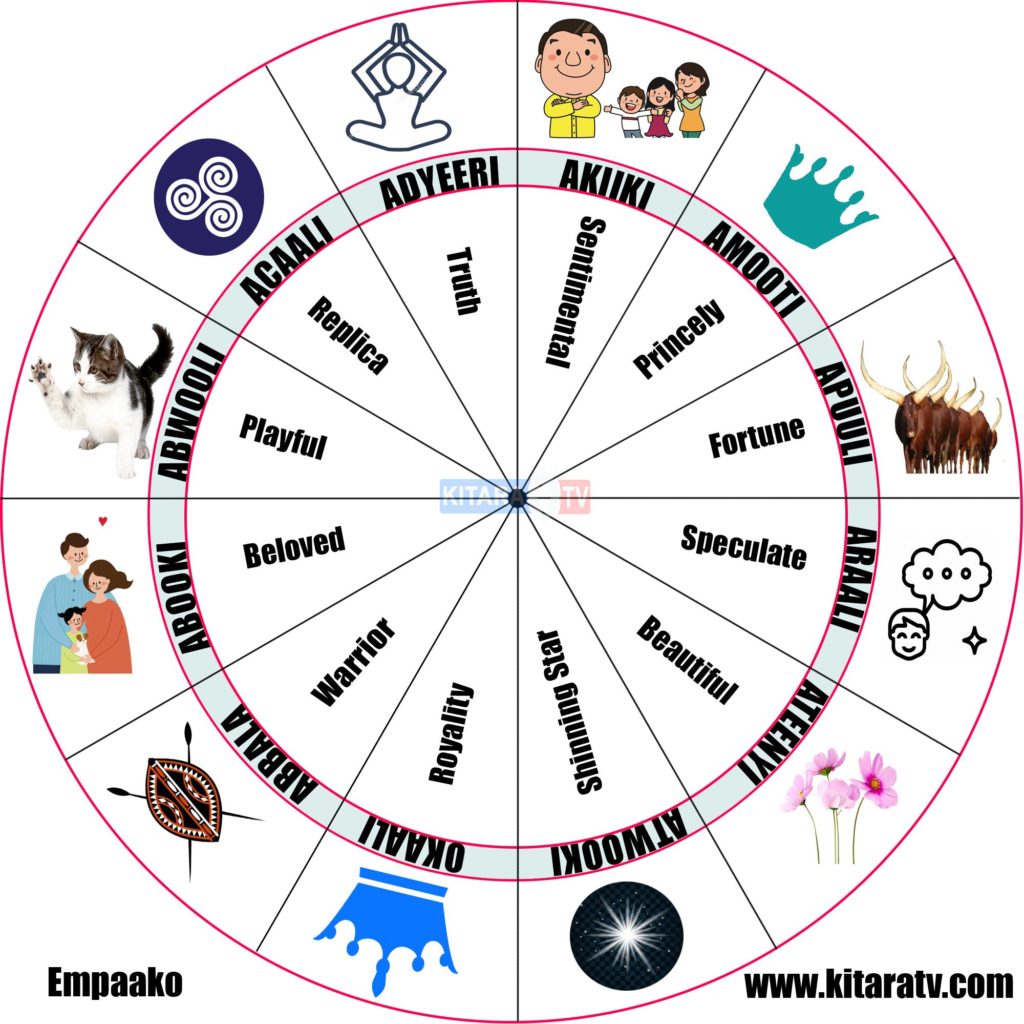
Empaako’s and the Babiito.
Like any new leader or management, when the Babiito took over from the Bachwezi, they made some changes or brought new management skills to the Empire of Kitara.
We have to note that the Babiito were bachwezi who had grown up from the maternal side of their family. Growing up from the maternal side with their mother Nyatworo and grandfather Chief Labongo, meant that they had learnt some of the customs of the Luo people.
Hence when they moved into Kitara, they introduced some of those customs.
1. When they moved into Kitara, they found two class systems, Bahuma and Bairu, so they introduced a third class system called “banyoro”meaning “chief or elevated men” if one was appointed to govern an area he was referred to as a Munyoro. These Banyoro were sent to govern some areas of Muhwahwa(Buganda). So the Baganda would say “Batuletede Omunyoro” hence the name become synonym with Bakitara People.
2. The Chief/head of Babiito Clan is/was given a title of Okwir which is Luo Origin. Okwir in Luo means chosen one or highly poisonous, so it would perhaps mean a dangerous/tough person.
3. The introduced title for Kings, like Olimi, Winyi. etc
here is the list if the titles and their origin luo meanings.
a. Ocaki- means, to begin with or the first one. Its a name given to first born sons.
b. Oyo- means path ,its name given to someone born along the road or while mother is travelling.
c. Winyi- means to listen.
d. Olimi(olimo)-means to recieve, its aname given to someone treated with high value, (lim) also means wealth. The meaning is very diverse
e. Nyaika- mean, spread here/ multiply here.
f. Nyabongo – comes from Labongo meaning a child born in a foreign land and has no support from his blood brothers.
4. Another important thing they introduced were the empaako or praise names
Empaako is a praise or respect name introduced in Bunyoro-Kitara by the Babiito ruling class in the late 14th Century.
Empako comes from Luo root word “Pako” meaning Praises. It was a yearly cultural harvest ceremony done in the Capital Hoima and attended by all Chiefs of the empire and commoners.
In this cultural harvest, most people got one of the eleven empaako or mipako or Nyingpak names. Only one pako is/was reserved for the King.
The Empaako’s are borrowed Luo praise/respect names and all Banyoro, Batooro etc people must have at least one of them.
Below are the empaako with the actual meanings from the luo origin, as well as how and when a particular empaako should be given.
1) Atwooki “ah-TWOO-kee” from Atwok meaning shinning star. – Give if your child is born on a night with stars.
2) Ateenyi “ah-TEE-nyii ” from Ateng meaning beautiful. – Give empaako if you believe your child is beautiful.
3) Apuuli “ah-PUU-lee” from Apul or Rapuli or Ayaa. Apuuli is a very lovely girl in a family and all good things are given to her such as; Sweets, biscuits, good dresses, generally good things. She is the center of attraction and love in the family. Because finally God has answered the parent’s prayers of having a baby girl.
4) Amooti “ah-MOO-tee” from Amot meaning Princely- A sign of royality, mostly sons and daughters of kings and chiefs.
5) Akiiki “ah-KEE-kee” from Ochii/Achii/Akiki meaning followers of twins, In Kitara its mostly for first borns who are going to bare the responsibilties of thier siblings, a Sign of Sentiment.
6) Adyeeri “ah-DYE-ree” from adyee/odee meaning parents had failed to get a child and only got one after after seaking spiritual intervation, hence fortunate/truth.
7) Acaali/Achaali “ah-CHAA-lee” from Ochal meaning replica, Given to a child who resembled someone in the family or Ancestors.
8) Abbala “ah-BAA-la” from from Obal or Abal meaning destroyer/Warrior, usually for sons of chiefs.
9) Abbooki “ah-BOO-kee” from Obok or Abok meaning beloved, child out of strong love between parents.
10) Araali “ah-RAH-lee” from Arali/Olal or Alal/lost – Given to the only surviving child after mother has been losing many of her children and parents uncertain of child’s survival.
11) Abwooli “ah-BWOO-lee” from Abwolo meaning “I lied to you or did I lie to you”. i.e A woman can conceive but continues going into periods. That is where the lying come from, so a child born out this circumstance is named given Empaako Abwooli
12) Okali “oo-KAA-li” from “kal” (Royalty). Only for King in Kitara Customs
Sincerely,
Kitara Tv Research Team
www.kitaratv.com
Kwegesa Kumanyisa.
Empaako Heritage
Meanings of Empaako
Empaako is a praise name or a name of respect used among the Banyoro, Batooro, Batagwenda, Batuku, Basongora and Banyabindi of westernUganda.
Empaako are not indigenous Runyoro words; they were borrowed from Luo following the Biito (a Luo clan) conquest of the Bunyoro-Kitara Kingdom around the 14th or 15th century. “Pako” means “praise”.
Types of Empaako
We have 12 known empaako. Out of these, 10 begin with letter A and only one starts with letter O, and one with letter B
eight are believed to have Luo origins with four claimed to be an indigenous Kinyoro one. And that is Akiiki, Apuuli, Araali and Atwoki.
It is important to note that there is no mpaako exclusively reserved for women, while four – Araali, Apuuli, Acaali and Abbala are exclusively for men. The rest are unisex, save for Okali which is only for kings.
Empaako with luo Origins
- Bbala(Abbala):Is akin to the Luo word “Abalo” meaning “I have spoilt it”. According to our culture, it means someone who loves other people unconditionally. It was formerly reserved for those close to the king-maybe the reason why, even now, it is rare.
- Abbooki: Comes from a Luo word “Aboko” which means “I have narrated to you”. The holder of this praise name is meant to be someone who cherishes the roles of parents, teachers, elders, mentors, counsellors and leaders. The saying associated with this empaako. “eba y’ihembe.”
- Abwoli:Comes from a Luo word “Abwolo”, meaning “I deceive you”. However, in our culture, it has to do with diplomatic relationships. The theory behind this is that “Not all truth needs to be told always, because it might cause unnecessary and often avoidable hurt and pain”. for men and women; small girls are also addressed as Abwoli, also for cats, hence the saying “Abwooli Kajangu”
- Adyeri:Related to a Luo word “Adyero” which means that “I have sacrificed you”. In Bunyoro, however, Adyeri is someone who is friendly, affectionate with a larger-than-life heart. belonged to embandwa Kaikara, hence the saying “Adyeeri Kaikara”. Whoever is named Rwakaikara or kaikara is Adyeri
- Amooti: From a Luo word “Amoto” meaning that “I greet you”. In Bunyoro-Kitara, however, Amooti refers to someone who genuinely respects other people, thinking and speaking well of them. Saying associated with this empaako. “eba y’Omukama rundi ebya Ruhanga.”, Amooti is also the Official mpaako of the Omukama
- Araali:One who saves other people and is perceived to have the power of thunder, giving the expression “Araali Nkuba”. it is also the empaako of Omwucwezi Kagoro and all those called Kagoro as always Araali
- Ateenyi:Is derived from the Luo word “Atenyo”, meaning “I have left it”. In our culture, Ateenyi is someone who loves and understands a wrongdoer without condoning wrongdoing. it was associated with River Muzizi snake which was worshiped. Hence the saying “Ateenyi njoka ya Rwamuziizi”
- Okaali:Comes from a Luo word “Okalo”, meaning “S/he has jumped over you”. In Bunyoro-Kitara, however, it implies someone with the highest responsibility as a leader in the kingdom i.e. Rukirabasaija Agutamba Omukama. It used for Omukama only and even then by men only when greeting him.
- Acaanga*: In luo tradition it means “Someone who bosses”. It is an uncommon praise name, most likely because it might have been used by chiefs. questionable
Empaako believed to be of Kitara Origin
- Akiiki:Is one who upholds national, community and family interests with great love, care, kindness, honesty, etc [Perhaps this explains why this is a very popular mpaako among parents] It has no Luo root; it is the only praise name whose root is in Bunyoro-Kitara. The saying associated with this empaako. “Akiiki rukiikura mahanga”
- Apuuli:Means one who has powers, abilities and skills to attract other people, exhibiting qualities often observed and admired among small boy children. princesses can also be addressed as “Apuuli”
- Acaali:From a Luo word “Achaali”, meaning “I resemble you”. In Bunyoro it refers to someone who resembles another in nature and character and who easily relates to other people. its for men only; also for small boys and for dogs. hence the saying is “Acaali mbwa”
- Atwoki:One who embraces or punishes –as the case may be-other people either physically or spiritually. belonged to Omuchwezi Kagole. hence the saying “Atwoki Kagole”
NB: According to the Runyoro-Rutooro Orthography, letters “w” and “y” cannot be followed by double vowels. So this is how we spell the following praise names: Atwoki, Adyeri, Abwoli. Only one praise name has two double letters: Abbooki.
Note:
Okaali
Exclusively reserved for Kings(Abakama)
Araali, Acaali, Apuuli, Bbala, Acaanga
Exclusively reserved for males
Atwoki, Akiiki, Abwoli, Adyeri, Abbooki, Ateenyi, Amooti
Unrestricted
Amooti and Adyeeri
Twins
Acaali, Apuuli
Males and Small boys
Abwoli
Unisex, Small girls and cats
Acaali
Males and dogs
Empaako za bacwezi
Mugarra Karundi Adyeri
Mulindwa Abwoli
Kagoro Araali
Kyomya Amoti
Wamara Abooki
Ndahura Atwoki
Empaako for those who follow twins
Kiiza – Amooti
Nsungwa-Adyeri
Kaahwa-Ateenyi
Empaako Ceremonies in Bunyoro-Kitara
Empaako is a naming system practiced by the Banyoro, Batooro, Banyamwenge, Banyakyaka, Basongora ,Batuku, Batagwenda and Banyabindi from western part of Uganda whereby children are given one of twelve praise-names shared across the communities in addition to their given and family names.
Addressing a person by her or his Empaako name is a positive affirmation of social ties. It can be used as a greeting or a declaration of affection, respect, honour or love. Use of Empaako can defuse tension or anger and sends a strong message about social identity and unity, peace and reconciliation.
When is Empaako conducted?
This ceremony is done when there is a newly born baby in a family. It is normally conducted after 3 days for a baby girl and 4 days for a baby boy after birth, the four and three days respectively are to help the mother to heal, boy tend to be more troublesome during delivery.
It is also conducted when someone crosses from another another culture to Bunyoro culture and this is done as hospitality or when a munyoro son or daughter marries from another tribe.
Traditionally child delivery was administered by the traditional birth attendants in the Bunyoro empaako community in one of the rooms(omukisiika) in the family house and this is where the child stayed(stays) for three days for the case of a girl and four days if the child is a boy, in case of the modern hospital childbirth on return the room the child is first laid to rest becomes the sacred room until the specified days above are over and the proceedings of the empaako naming ritual are sanctioned.
During the sacred days the farther of the child is not expected to engage in any sexual activities in case of polygamous setting and he is expected to keep around the mother and the baby offering great care and support. Within the three or four days of the child’s sacred period(while in the sacred room) village folks who are friends and relatives of the family continue to bring food drinks and others items which will be used during the empaako ceremony at the end of the specified days.
Early morning at dawn (hamambya) at the end of the sacred days village members, friends and relatives begin to throng the home of the child to be given the empaako, women start preparations of the food items eg grinding of millet, frying and pounding of the ground nuts (ebinyobwa), collecting firewood in the nearby forest or hill etc, men and boys start fetching water from the fresh wells, making final touches on the ceremony hour, elders will start to arrive and engage guiding of the required ceremony standards of the day, meanwhile the mother of the child keeps inside the sacred room taking grate care of the child and breastfeeding the baby to ensure limited cries during the ceremony proceedings.
The Empaako Ceremony/Ritual proceedings (4th or 5th day depending on Child’s sex)
At exactly 6:00 am a goat is slaughtered, it is taken to a nearby banana plantation or bush and the mother to the newly born baby is called up to slap or cane the goat once a gesture which signals that the mother of the child has acknowledged the kick off of the day’s proceedings starting with the slaughtering of the goat.
The goat is slaughtered later on the intestines of the goat well prepared or cooked and given to the mother to take as a way of replacing blood lost during child delivery and also to increase on the breast milk, the rest of the meat is used to serve the guests who have come to witness the naming ceremony.
Food, Drink Preparations and gifts (4th or 5th day depending on child’s sex.) 8am to 11am
Names of traditional meals:
- “Ekihuro ky’oburo n’enyobwo”- meal of ground nuts and millet
- “Amacalya sauce” – it is comprised of the following traditional mashrooms called “obutuzi bw’ensorro”, sliced and dried young pumpkins (Ebikeke), white aunts (enswa z’empahu”, Ground nuts (ebinyobwa), cooked and dried and pounded young leaves of cow pies-vigna unguiculata (enkoole)Dried meat (Omukaro gw’enyama), Onions (Obutunguru) and Tomatoes (Enyaanya) these are prepared jointly and fine sweet out come of the sauce is what is called “Amacalya” tasty sauce. Amacalya sauce is jointly eaten by all those performing the traditional ceremony.
- Embuzi – goats meatis shared across all those performing the empaako naming ceremony but the intestines are all reserved for the mother of the baby other guests also do enjoy the goats meat
Traditional Ceremonial Baskets:
Three traditional baskets are prepared called “endiro” each containing a different food item.
- “akaitamukago” is basket containing sweet cooked coffee mixed with salt, is simply eaten to signify the strong friendship amongstthe family members, the newly born baby and those performing the empaako naming ceremony
- “egonja”- musa species, is a basket containing egonga that is smoked on the traditional fire until it ready to be eaten, signifying that the baby should be a darling of the people, he should be loved the way this special sweet banana is adored and loved to be eaten in the society of the Banyoro empaako naming ceremony in western Uganda.
- “amacande” basket contains a combination of fried sim sim “sesame” or locally called amacande ground nuts, cow pies-vigna unguiculata
Traditional Drinks
- Esande. traditional drink(non alcoholic)prepared from traditional bananas “embirre”
- traditional alcohol prepared from traditional bananas “embirre” and mixture of sorghum, fresh water drawn from fresh natural wells (eiziba) must be used, this is put in a pot and placed at the corner in the sitting room as early as 6:00am to allow it cool,
- haragia special whisky type are filled up in two bigger traditional calabashes, traditional small drinking calabashes are also prepared known as “enkooba”-for taking the alcohol and “entahyo”-for drinking water, this is normally processed by heating up tonto and turning it into steam, then condensing it to form haragi
After food is being shared family members and friends present their gifts((Kurabuka Omwana) to the baby and rituals follow, the gifts involve goats, cows, chicken and money, which will become “capital” for wealth accumulation for the growing child.
The empaako naming ceremony between 12:00pm-1:00pm. (4th or 5th day depending on child’s sex.)
Naming of Empaako in Runyoro language is called “kuraka omuntu” Empaako is given at a naming ceremony performed in the home and presided over by the clan head, elder Male or grandfather in the house.
Once it clicks mid day a signal which is always given by the cockcrowing, the grandfather of the child sanctions the practical final ceremony, he sits on the a very small stool chair which must be the only chair in the sitting room others amongst whom include the farther, uncles and aunties of the baby sit on the floor which is littered by lemon grass traditionally known as “eteete”.
The child’s grandfather, eldest son or clan head) summons the new baby be brought into the sitting room, the baby is carried from the sacred room by one of the sisters of the farther to the child, he hands the baby over to the grandfather or Isenkati(aunt) who inspects the features of the child to ascertain as to whether he or she belongs to the family, if confirmed that baby belongs to the family then the grandfather or aunt hands the baby over to the its father and the father hands over the baby to the mother and the mother then hands over the baby back to the grandfather or Aunt, but if the child is confirmed not to be belonging to the family then the ceremony doesn’t proceed and a council of elders converge to sort out all the possible mess entailed there in.
The holes of Birigenda and Owomuka
Once the grandfather is inhold of the baby once again he moved to the door step and the farther of the child moves in front of him holding the amblical code known as “Engoma” if the baby is a girl a small hole is dug by the farther just besides the front door and if it’s a boy then the hole is dug inside the house.
The girl is referred to as Birigenda implying the girl will one time go away and get married and the boy Owomuka he will stay and produce children belonging to that family reasons why the boys amblical code buried inside the house.
the boys umbilical code is planted in a special style where by four leaves of special tree called omuko-the Uganda coral or “eryntrina abyssinica” and some special shrubs called orweza “mount knotgrass” and orwihura are laid down in the hole then the umbilical code placed on top and there after covered again by the same items in same quantity but before they pour there traditional alcohol called “tonto” and also after covering the hole they repeat the pouring all aimed at drawing blessings for the baby.
If it is a girl its omusambya-“Nile Tulip” tree leaves and three of them but the sharp ends of the leaves put in the hole facing the direction where they are going to plant the banana, reason is because the girl will go away, but for the boy the muko leaves are set in a harvesting or triangular form signifying asking for production of more children by the baby boy.
Planting of the Banana stem or Omutoma tree and giving a calf
For a Girl Child: Banana Stem
After the mini-ceremony of the burying of the umbilical code then comes the planting of the Banana or Omutoma Stem or giving a calf, from the door step the grandfather proceeds with the father and the uncles and the aunties to the place where the banana or mutoma stem is planted, the grand father hands over the child to the its mother who must be kneeling down, the grand father does some short of gardening and then symbolic of planting sim sim “sesame” is and other seeds like cow pies-vigna unguiculata (this is called kumiisa or kusugira) is signifies that the child must be a hardworking farmer and also signifies that a banana is planted alongside other crops for sauce once this is done then a hole is dug and the banana plant is inserted in, the child is laid down besides the banana plant and special shrub of orweza “mount knotgrass” and orwihura are laid down and words of blessings are spoken on him or her and during normally at this juncture the child can not cry he or she remains peaceful through out the banana planting process
For a Boy Child: Mutoma(Ficus natalensis) Tree
And for the baby boy, the tradition involves giving the young boy a calf(young cow) and naming it after the him. The cow is a symbol of wealth, or Planting a Mutoma(Ficus natalensis) tree, the tree signifies abundance and Perpetuity/longevity
Final naming segment of the Empaako
After going through all the preliminary processes, including the banana/Mutoma planting or giving the boy a calf segment the grand farther of the child picks the child from the ground and they proceed back to the house for real naming segment of the child.
Here the paternal aunts(Isekanti) receive the baby and examine its features. Any resemblance to existing relatives forms the basis of the choice of name.
The grand dad, oldest male or clan elder sits on a small stool which is the only one in the living room, reaches out to his pocked and gets money which is locally referred to as “simoni or ensimbi”, and gives it to the child. The grand dad, oldest male or clan elder announces the official empaako to the child depending on the features on the baby has as inspected at the beginning of the process, these features must be resembling one of their ancient relatives, Then the traditional foods or meals as expounded above are brought and it’s the grand father who starts by eating millet and groundnut source, as the rest call up on the loudly the empaako of the child “empaako yaawe niiwe Amooti/Ateenyi etc” your praise name is Amooti.
e.g “I name you Kugonza Apuuli because you resemble my late grandfather, Kugonza Apuuli,” he declares, amid clapping and approval by the family members.
If its giving empaako to a son/daughter in law, the ceremony involves the omuko seating on the the laps on the head of Clan four times, while for nyinabuko(daughter in law), it involves seating on the elder of the clan three times, and then the empaako is given after wards depending on the circumstances and features
Ceremonies after naming
After naming the child, family members with invited guests share a traditional meal(Ekihuro) of millet, mushroom soup(obutuzi), peanut sauce “enyobwo”, smoked beef (omukaro), traditional local brew(tonto) and then tradition songs follow.
Later all those in the house begin putting presents of money etc in a traditional basket others can decide to bring food crops chicken, goats etc which aren’t brought in the sitting room if they are in bulk but they are announced to the grandfather and the father of the baby, all the prepared traditional meals and alcohol drinks are finally shared and the baby is given back to the father the father hands over the baby to the mother as the traditional meal eating continues.
The other guests are also served in the courtyard merry making and eating singing and dancing traditional songs continues until the wee hours of the night.
Empaako for Twins
On the other hand, there are praise-names which are given automatically after birth as one was born a twin. If Both Twins are Male “As the older twin (Isingoma), is automatically called Amooti and the younger twin (name Kato) Ayeri., If Both Twins are Female, Female- first born Nyangoma is Amooti , Female-second born Nyakato is Adyeri. Incase of Male and female Twin or Female and Male Twin, the Empaako will be Amooti and Adyeri respectively.
The siblings which follow twins are also given particular empaako, e.g.
- After Abarongo(twins): Kiiza(both sexes) is always Amooti
- After Kiiza: Kaahwa(both sexes) – Ateenyi
- After: Kaahwa: Irumbaif a boy, Nsungwa if a girl – Adyeri
- then Barongo if boy or Nyamahunge if girl – Abwooli
The Empaako Tradition
Empaako is accorded to every Munyoro in addition to their traditional and religious names. Empaako is one thing that will readily identify a Munyoro. Empaako is a special name of endearment used to show love and respect, for salutation and by children to refer to their parents and elders.
“It is okay among the Banyoro and Batooro not to know one’s surname or religious names but everyone is expected to know another person’s praise name because it is what is used more often”
When a Munyoro meets another Munyoro, the first thing is to ask the other person’s Empaako, (Empaako yaawe? – what is your praise name) and then greet the person using the praise-name,”
Greeting without Empaako is like having food without source, or any tasteless attempt you can think of.
The role of Empaako
Empaako plays three important roles in one’s life.
In greeting. The two address each other using Empaako. One asks Empaako only on first interaction.Addressing a person by his or her Empaako name is a positive affirmation of social ties.
Neutralising anger and tension. Greeting or addressing by Empaako to a person one is in conflict with, sends strong message of compromise, peace and reconciliation.
The members of the bearer communities believe that Empaako mysteriously evaporates from the memory of the two people whose relationship gets strained, only to be recovered at reconciliation.
Respect and Honour.
Empaako is also a form of address in all positively subjective conditions of human interactions like;
• Expressing respect and honour to a parent, an elder, a leader, spirit medium and gods;
• Expressing affection to a companion, a lover, a tender minor, a sick or suffering, a missed or dead dear one;
• Appealing for favour from human or superhuman powers;
• Expressing thanks and bidding farewell.
Therefore, while Empaako is given along with a surname, the two serve completely different roles. The surname is only for official and impersonal address.
Threat to Empaako
The transmission of Empaako through naming rituals has dropped due to inter-marriages and it’s diminishing because of lack of the elders to teach their children their mother language and cultural norms.
Some of the elders say that there are no longer extended families and family/clan meetings where they used to seat and tell their children such information regarding the ceremony due to technology, rural urban migration, time, poverty and work.
In a nutshell Empaako naming ceremony/ritual is one of the most treasured ceremonies across Bunyoro and beyond it is such a beautiful intangible cultural heritage and still celebrated todate though it is being affected by external threats emanating from other religious believers like the Faith of Unity and Sisimuka an Anglican faith these don’t believe in the traditional cultures to Bunyoro Empaako Community, it is a unique and interesting ceremony which one wouldn’t wish to miss in a life time.
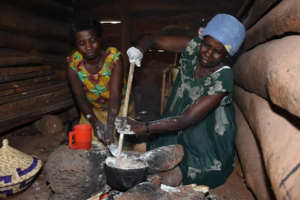
Okuhotoro oburo(making millet)
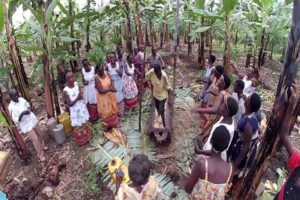
Making local brew (tonto)
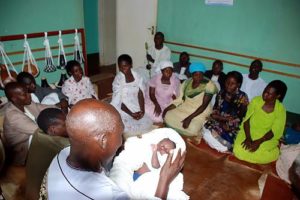
Giving the praise name (empaako)
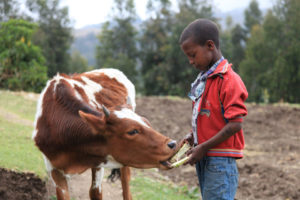
Giving the boy a calf
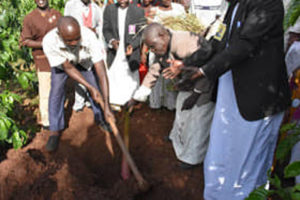
Planting(Okubyara) banana or Mutoma Stem
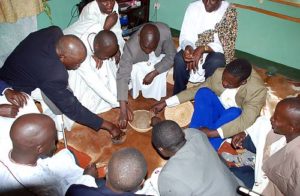
Feasting time(oburo, omukaro, obutuzi, tonto)
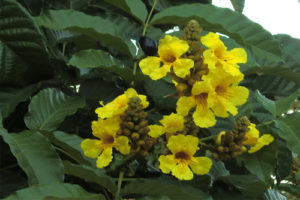
nile-tulip- Omusambya
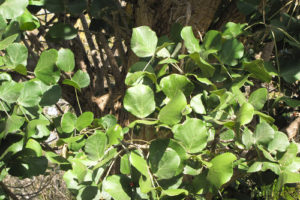
omuko leaves – erythrina abyssinica
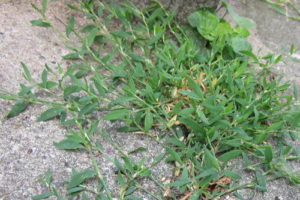
Orweza – knotgrass